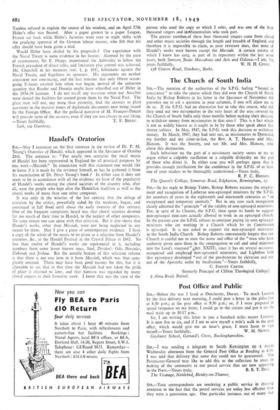Handel's Oratorios
SIR,—May I comment on the first sentence in the review of Dr. P. M. Young's Oratorios of Handel, which appeared in the Spectator of October 28th. The sentence is: " For nearly two centuries the vocal music of Handel has been represented in England for all practical purposes by one work—Messiah." In connection with this statement one would like to know if it is made by the reviewer himself, or has he gathered it from his examination of Dr. Percy Young's book ? In either case it does not seem to be in accordance with all the evidence we have of the popularity of Handel's works among the choral societies of the country who, after all, were the people who kept alive the Handclian tradition as well as the choral works of more than one other composer.
It was only in the nineties of the last century that the deluge of criticism by the critics, powerfully aided by the moderns, began, and continued in full flood until about the early twenties of this century. One of the frequent complaints heard was that choral societies devoted far too much of their time to Handel, to the neglect of other composers. To some extent one can agree with that criticism. But it also shows that Handel's works, other than Messiah, were not being neglected to any extent by them. May I give a piece of contemporary evidence. I have a copy of the whole of the music to be given as a selection from Handel's oratorios, &c., at the Handel Festival in the Crystal Palace in 1862. No less than twelve of Handel's works are represented in it, including numbers from some lesser known ones, Saul, Dryden's Ode, Hercules, Deborah and 7oshua. But the notable feature of this selection volume is that there is not one item in it from Messiah, which was thus com- pletely omitted. There may have been good reasons for this, but it is allowable to say that at that time the Messiah had not taken the pride of place it attained to later, and that Samson was regarded by many choral singers as their favourite work. I know that was the view of the person who used the copy to which I refer, and was one of the four thousand singers and iiigniumentalists who took part.
The greater number,of these four thousand singers came from choral and other music societies through the length and breadth of England, and therefore it is impossible to claim, as your reviewer does, that none of Handel's works were known except the Messiah. A certain society of which I know has sung, as part of its repository within the last seven years, both Samson, qudas Maccabeus and Acis and Galatea.—I am, Sir, yours faithfully, W. H. H. COURT. r58 Craven Road, Newbury, Berks.














































































 Previous page
Previous page